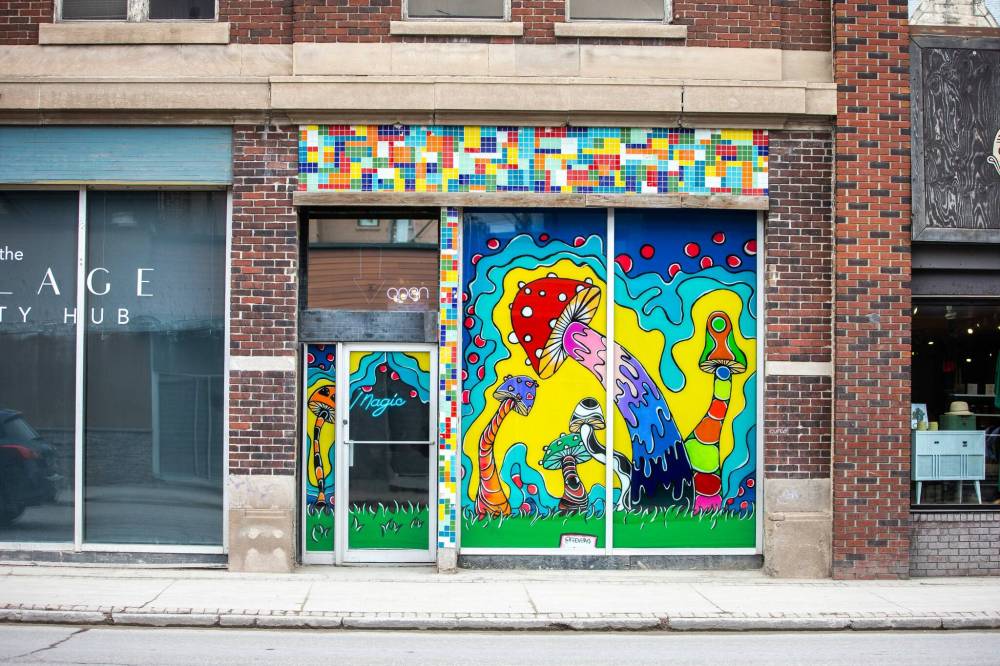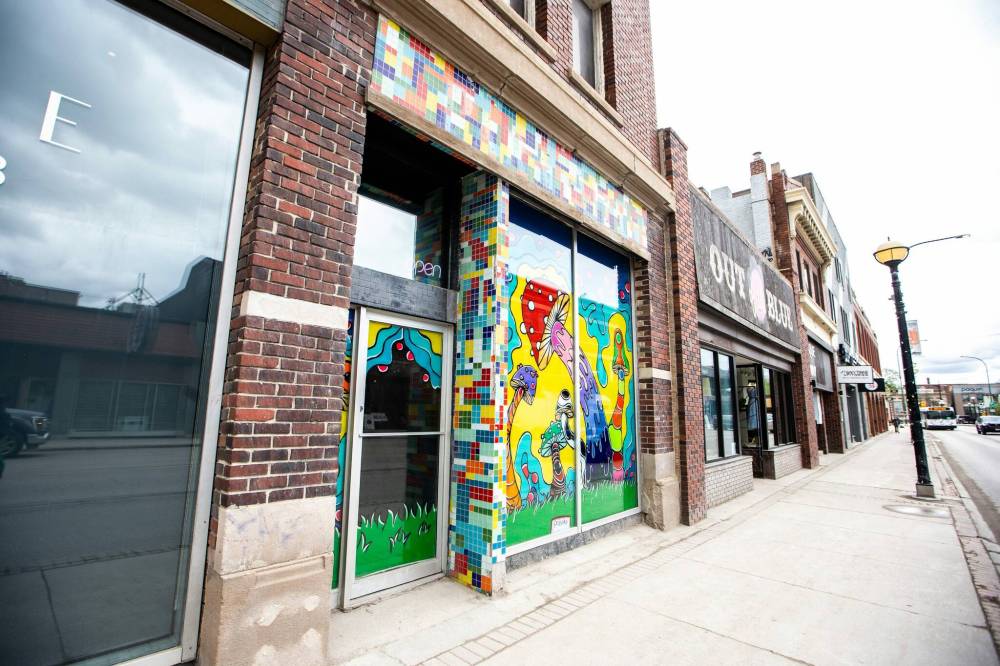Magic mushroom dispensary sprouts in Osborne Village
Advertisement
Read this article for free:
or
Already have an account? Log in here »
To continue reading, please subscribe:
Monthly Digital Subscription
$1 per week for 24 weeks*
- Enjoy unlimited reading on winnipegfreepress.com
- Read the E-Edition, our digital replica newspaper
- Access News Break, our award-winning app
- Play interactive puzzles
*Billed as $4.00 plus GST every four weeks. After 24 weeks, price increases to the regular rate of $19.00 plus GST every four weeks. Offer available to new and qualified returning subscribers only. Cancel any time.
Monthly Digital Subscription
$4.75/week*
- Enjoy unlimited reading on winnipegfreepress.com
- Read the E-Edition, our digital replica newspaper
- Access News Break, our award-winning app
- Play interactive puzzles
*Billed as $19 plus GST every four weeks. Cancel any time.
To continue reading, please subscribe:
Add Free Press access to your Brandon Sun subscription for only an additional
$1 for the first 4 weeks*
*Your next subscription payment will increase by $1.00 and you will be charged $16.99 plus GST for four weeks. After four weeks, your payment will increase to $23.99 plus GST every four weeks.
Read unlimited articles for free today:
or
Already have an account? Log in here »
Hey there, time traveller!
This article was published 18/05/2023 (877 days ago), so information in it may no longer be current.
Magic mushrooms are sprouting in Osborne Village.
Dispensaries, such as Magic Mush — which opened its doors here last Saturday — are illegal in Canada, although they are cropping up across the country.
The shop on Osborne, with its bright street-facing mural of red and green topped mushrooms, claims to be the first of its kind in Manitoba.

MIKAELA MACKENZIE / WINNIPEG FREE PRESS
Magic Mush in Osborne Village, with its bright street-facing mural of red and green topped mushrooms, claims to be the first-of-its-kind magic mushroom dispensary in Manitoba.
Ottawa has banned the production, sale and possession of magic mushrooms unless authorized by Health Canada. In the past, exemptions have been granted for people living with mental-health disorders, among other reasons.
Psilocybin and psilocin are the active chemical compounds in magic mushrooms. Both are hallucinogens classified as Schedule III substances under the Controlled Drugs and Substances Act.
Magic Mush is running a safe and responsible operation, said Jamie Kagan, a Winnipeg-based lawyer from Thompson Dorfman Sweatman representing the company’s owners.
The owners currently operate stores in Ottawa and Toronto, Kagan said.
“If people in Toronto can acquire the product and are not being charged and not being criminally prosecuted, should people in Winnipeg not have the same options?” he said.
“This isn’t a product that is being used to go to the bar and have a good time. It’s people that are trying to treat some health issues, mental-health issues (such as depression and anxiety).”
Customers must show photo identification and be at least 19 years old. There’s a cap on the number of grams purchased, Kagan said. The store doesn’t have a street-facing sign displaying its name.
As of Thursday morning, the Winnipeg Police Service had neither seized Magic Mush products nor handed out tickets. They are aware of the storefront, WPS spokesperson Ally Siatecki wrote in a statement.
Officers work with Ottawa regarding dispensaries, she added.
“At some point in time, I suspect there will be a formal response,” Kagan said, adding police in other provinces have not taken any aggressive action to stop similar businesses from operating.
Winnipeg Police Service Chief Danny Smyth is president of the Canadian Association of Chiefs of Police. In the past, the association has supported the decriminalization of personal possession of small amounts of illicit drugs and has endorsed alternatives to criminal sanctions in such cases.
“We are trying to run a responsible enterprise as best we can,” Kagan said. “There are a lot of issues in Winnipeg that need police attention. A business selling a product that people want and can consume with care doesn’t need to be the focus of their attention.”
The store has been in the works for roughly a year. The province doesn’t oversee magic mushroom operations, nor does the city.
“Any type of retail use is permitted in commercial zones,” city spokesman Kalen Qually wrote in an email.
The Liquor, Gaming and Cannabis Authority of Manitoba licenses retail cannabis spaces, but psilocybin is outside its purview.
“(The Magic Mush owners) simply signed a lease (and) guaranteed that they would pay their lease,” Kagan said. “They opened up their storefront in hopes that this would be something that… the Manitoba market would be receptive to.”
Used for focus, productivity, stress: customers
By mid-Thursday, Magic Mush had sold out of gummies. Customers filtered through the store, asking for chocolate and capsules, getting money from the ATM stationed near the door.
RJ Kusmack left with a $50 packet of capsules.
“(Magic mushrooms) help me with mental focus, mental health and productivity,” Kusmack, 41, said.
Microdosing — taking small amounts of the drug — is Kusmack’s version of a cup of coffee, he said, adding the drug helps him to focus his attention deficit hyperactivity disorder-affected brain.
He’s been buying magic mushrooms for decades “from a guy in a 7-Eleven parking lot, not knowing where they came from, not knowing how they were produced.”
Magic Mush’s products are processed in Ontario, according to the company’s lawyer.
“This is the way it should be,” Kusmack said. “This would be a great addition to our cannabis dispensaries… to be able to sell where it is taxed, where it is regulated by Health Canada.”

MIKAELA MACKENZIE / WINNIPEG FREE PRESS
Magic Mush in Osborne Village doesn’t have a street-facing sign displaying its name.
Kusmack opened Fiddler’s Green Cannabis Company in 2021.
Winston Clarkson, who was tucking his own purchase in a vest pocket, said he’s visited stores similar to Magic Mush in Vancouver, where he used to live.
For Clarkson, 37, the substance can lead to a “spiritual retreat.” It removes life’s distractions and stresses, he said.
More dispensaries expected
“We can probably expect more (like Magic Mush) to pop up over time,” said Bradley Poulos, a lecturer at Toronto Metropolitan University who studies the cannabis industry.
It’s no surprise that Winnipeg has joined the growing number of Canadian municipalities with illegal dispensaries, Poulos said.
The movement is similar to what happened in the cannabis industry, he added. Illegal dispensaries were around for roughly five years before Ottawa legalized the drug in 2018.
Poulos split Canadian magic mushroom dispensary owners into two categories — entrepreneurs wanting to profit and activists pushing Ottawa to legalize psychedelics.
“They’re trying to make a point here,” he said.
‘Psychedelic renaissance’
Health Canada’s website warns magic mushroom consumption could lead users to see or feel things that aren’t there. Anxiety, fear, nausea and muscle twitches are listed among the possible effects.
The website continues to note there is “increasing interest” in potential therapeutic uses of magic mushrooms and psilocybin. Currently, there are no approved therapeutic products containing psilocybin in Canada.
“Products sold by (storefronts or online vendors) are unregulated and may be unsafe,” Charlaine Sleiman, a spokeswoman for Health Canada, wrote in a statement.
Health Canada did not answer the question about whether Ottawa is considering legalizing magic mushrooms. Research on using psilocybin to treat various mental health disorders is ongoing, Sleiman noted.
“While some initial clinical trials have shown promising results, the evidence is currently limited,” she added.
”Politicians and regulators are going to have to reckon with what seems to be a growing gulf here between what Canadians want and what Canadians are legally permitted to purchase.”–Erika Dyck
“There’s a disconnect here between what Health Canada or the federal government is approving and what the market is creating,” said Erika Dyck, Canada Research Chair in the history of medicine.
There’s a “psychedelic renaissance,” spurred on by mainstreaming and celebrity endorsements, and following the legalization of cannabis, Dyck said.
“It’s going to be interesting to see… whether Canadian politicians and regulators are going to have to reckon with what seems to be a growing gulf here between what Canadians want and what Canadians are legally permitted to purchase,” she added.
Psilocybin has been prohibited in Canada since 1975.
gabrielle.piche@winnipegfreepress.com

Gabrielle Piché reports on business for the Free Press. She interned at the Free Press and worked for its sister outlet, Canstar Community News, before entering the business beat in 2021. Read more about Gabrielle.
Every piece of reporting Gabrielle produces is reviewed by an editing team before it is posted online or published in print — part of the Free Press‘s tradition, since 1872, of producing reliable independent journalism. Read more about Free Press’s history and mandate, and learn how our newsroom operates.
Our newsroom depends on a growing audience of readers to power our journalism. If you are not a paid reader, please consider becoming a subscriber.
Our newsroom depends on its audience of readers to power our journalism. Thank you for your support.






